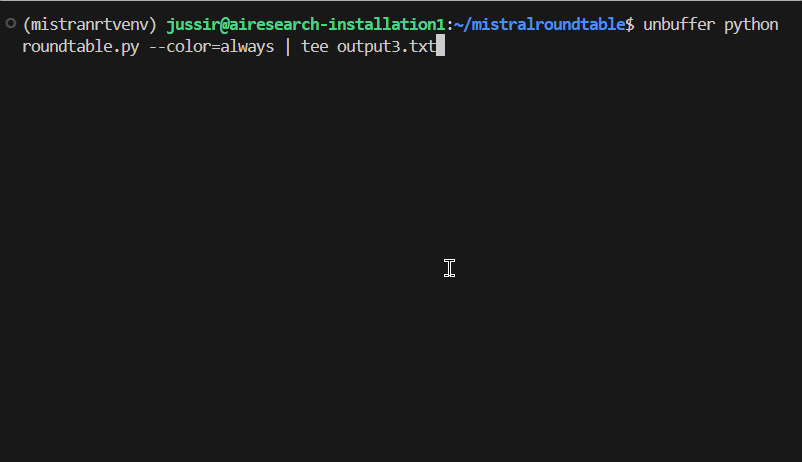This is a simple script that sets up a roundtable of AI agents for a discussion of the given questions.
An example of agents discussing
The script works by building prompts that guide the discussion and keep it and the personas on track and produces "content" by doing completion requests to an OpenAI compatible API large language model (LLM) AI endpoint.
The agent personas are described in the participant/roleN.json files, where N must start from 1 and increase consecutively until enough roles are defined. Each of these role JSON files defines an object with fields "name", "full_name", "creativity", and "prompt". Here, the "creativity" should be a float from the range of 0.0 to 1.0. It basically controls the temperature of the LLM. Lower the creativity, the more conservative the output is. Furthermore, the "prompt" should start with "You, as an AI assistant, will take the role of" or something similar. See the folder for examples.
The context for the roundtable discussion and the questions the roundtable discusses are stored in the task/ folder. Feel free to edit context.txt, instructions.txt, and questions.txt as you see fit.
Finally, there are some settings in the beginning of the main roundtable.py script. These define, e.g., how long certain topics are discussed, how often the participants are prompted to ask the opinion of others, how long the discussion should continue, and so on.
The roundtable requires two parts to be running simultaneously:
- A server serving OpenAI compatible LLM completions API.
- The main
roundtable.pyscript.
For test purposes, there is also a test/dummyllmserver.py. This uses flask and markovify to implement a minimal language completion server based on a Markov chain text generation model built from the sentences of the prompt.
For actual use, there is a modelup.sh script to run Mistral-7B-Instruct-v0.2 model locally on your machine.
To be more specific, the script modelup.sh runs a docker command that pulls a vllm image that serves the latest Mistral-7B-Instruct-v0.2 model through an API on port 8000. The model is loaded from Hugging Face, and, therefore, before running the modelup.sh script you need to:
- Register and log in to Hugging Face.
- Get your Hugging Face token. As of the time of writing this instruction, click your profile circle/icon in the top right corner of the Hugging Face website, choose Settings, go to Access Tokens on the left side list, generate New token or refresh an existing one. Copy it to the clipboard.
- In the terminal session where you would like to run the LLM, set the
$HF_TOKENenvironment variable with:$ export HF_TOKEN=hf_<rest of your secret here>
- Accept the terms and conditions on the Hugging Face model page: https://huggingface.co/mistralai/Mistral-7B-Instruct-v0.2
Now, you can finally start serving the Mistral-7B-Instruct LLM:
$ sh modelup.shGood. Now, in a second terminal session, you can create a virtual Python environment (recommended) and then run the main roundtable script. Assuming you are in the airoundtable folder, run the following commands:
$ python3 -m venv .roundtable_venv
$ source .roundtable_venv/bin/activate
$ which pip # to verify that the venv pip is used
$ pip install openai colorama
$ pip install flask markovify # for the dummy serverOf the requirements, the colorama module is used to provide ANSI colors to make the terminal output look pretty, the openai module is used to provide a convenient way to use OpenAI compatible LLM APIs, and docker can be avoided if one uses third-party served models or some other way of serving an LLM model through an OpenAI compatible API.
The dummy minimal text completion server requires flask and markovify Python modules to be installed.
This project is licensed under the MIT license - see the LICENSE file for details
